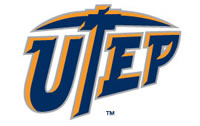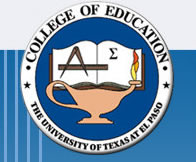
Bill Robertson, Ph.D. - Classes
Teacher Education Department
MSED 4311 - Teaching Science in Intermediate and Middle Grades - Syllabus
It’s what you learn after you know it all that counts. - John Wooden
Instructor: Dr. Bill Robertson
Phone: 747-8608
Office: Education Building, Room 604
Email: robertson@utep.edu
Class Web Site: http://utminers.utep.edu/robertson/classes/msed4311/default.htm
Office hours: By Appointment
Texts
Richard Howell Allen (2001). Impact Teaching: Ideas and Strategies for Teachers to Maximize Student Learning, Allyn & Bacon.
Robertson, William H. (2008). Developing Problem-Based Curriculum: Unlocking Student Success Utilizing Critical Thinking and Inquiry, Kendall Hunt Publishing, Des Moines, Iowa.
Rutherford, F. James and Algrehn, Andrew (1990). Science For All Americans, New York, Oxford University Press.
Course Description
This course will explore the methods and materials needed for teaching science in fourth through eighth grade. The emphasis of the class will be placed upon inquiry and standards-based teaching and learning. This includes the utilization of computer applications and field experiences.
Goals
This course is designed to help you examine critically the perspectives, philosophies, materials, and strategies for effective learning in middle school science classrooms. The ultimate goal is to understand how to design a learning climate where every student is held to high expectations and achieves maximum learning. In particular, the participants will develop a better understanding of effective science teaching and learning in schools in the unique border schools so our community will be equipped to make informed decisions about our world, to pursue science fields, to critically examine the power of science in our society, and to participate in improving our society.
Meeting Times
Classes will be on Thursday from 8:30 to 11:20 AM at Alderete Middle School during the spring 2011 semester. Homework will be assigned regularly. The class will be a combination of lecture, guided instruction, classroom discussion, classroom exercises, and project development. Every class meeting is vital. It is the students’ responsibility to meet with the professor to arrange an alternative for any class session missed. Cell phones and other forms of electronic communication should be turned off during class meetings.
TExES Standards
You will be practicing teaching using a constructivist curriculum designed to provide successful learning experiences for all the children. Through this actual classroom teaching experience, you will be practicing concepts from Standards I, II, and III on the Pedagogy and Professional Responsibilities Standards (PPR) with particular emphasis on planning and designing instruction, instructional strategies, informal and formal assessment, and managing the classroom environment. The class is also designed to address the following science standards from the 4-8 Comprehensive Standards:
- Standard I: The science teacher manages classroom, field, and laboratory activities to ensure the safety of all students and the ethical care and treatment of organisms and specimens.
- Standard II: The science teacher understands the correct use of tools, materials, equipment, and technologies.
- Standard III: The science teacher understands the process of scientific inquiry and its role in science instruction.
- Standard IV: The science teacher has theoretical and practical knowledge about teaching science and about how students learn science.
- Standard V: The science teacher knows the varied and appropriate assessments and assessment practices to monitor science learning.
- Standard VI: The science teacher understands the history and nature of science.
- Standard VII: The science teacher understands how science affects the daily lives of students and how science interacts with and influences personal and societal decisions.
Objectives
Demonstrate the following components vital to quality science education:
- Ability to implement an inquiry-based science curriculum
- Ability to assist students in designing investigations using scientific inquiry
- Understanding of the binational and bilingual implications in El Paso area science education
- Understanding of the role of women and underrepresented groups in science decisions and science careers
- Exhibit professionalism as a teacher of science
- Understanding of local resources and quality curriculum materials to assist your science program
- Improvement in your personal understanding of science concepts
- Understanding of standards for excellence (National Science Education Standards, TEKS, Excellence in Environmental Education -- Guidelines for Learning)
Course Requirements
- Class Participation and Attendance (15% of course grade): It is expected that all students will be actively and professionally engaged in class discussions and activities. Successful completion of the course depends on regular participation and interaction in classroom and online learning experiences. Students missing a class are responsible for completing any exercises, readings, etc. as well as writing a one-page essay on the readings before the start of the next class. Numerous absences may adversely affect your grade and three unexcused absences will lower your grade one letter grade automatically.
- Written Responses (40% of course grade): Discussions, assignments and quizzes document your reflective thinking and learning. These must be submitted by the due date in WebCT. Each student is expected to complete all readings, exercises, discussion and written assignments. Students missing the due date for an assignment must make immediate arrangements with the instructor to fulfill that requirement before the next class meeting.
- Written and oral reports: (40% of course grade): You will develop and implement a series of quality science lessons and the in-depth analysis of those lessons. These lessons will demonstrate good curriculum practices and integrate sound pedagogical techniques and educational philosophies. You will also be expected to model these techniques within your presentation and instruction. Written work is expected to be submitted on the due date assigned and in proper written format. This will also include both your midterm and final projects.
- Community Outreach Activity (5% of grade): Students will participate in and provide a 2-3 page reflection paper on a community outreach activity. This activity can focus on any of the following areas: parenting, communicating, volunteering, learning at home, decision making and collaborating within the community.
Grading Evaluations
A: 90% - 100%, B: 80% - 89%, C: 70%-79%, D: 60%-69%, F: <60%
Academic Dishonesty
Academic dishonesty is prohibited and is considered a violation of the UTEP Handbook of Operating Procedures. It includes, but is not limited to, cheating, plagiarism, and collusion. Cheating may involve copying from or providing information to another student, possessing unauthorized materials during a test, or falsifying research data on laboratory reports. Plagiarism occurs when someone intentionally or knowingly represents the words or ideas of another person’s as ones’ own. And, collusion involves collaboration with another person to commit any academically dishonest act. Any act of academic dishonesty attempted by a UTEP student is unacceptable and will not be tolerated. Violations will be taken seriously and will be referred to the Dean of Students Office for possible disciplinary action. Students may be suspended or expelled from UTEP for such actions.
Students with Disabilities
If you have or believe you have a disability, you may wish to self-identify. You can do so by providing documentation to the Office of disabled Student Services located in Union E Room 203. Students who have been designated as disabled must reactivate their standing with the Office of Disabled Student Services on a yearly basis. Failure to report to this office will place a student on the inactive list and nullify benefits received. If you have a condition which may affect your ability to exit safely from the premises in an emergency or which may cause an emergency during class, you are encouraged to discuss this in confidence with the instructor and/or the director of Disabled Student Services. You may call 747-5148 for general information about the Americans with Disabilities Act (ADA).
Syllabus | Schedule | Assignments | Readings | Evaluation | Links

Bill Robertson, Ph.D. (robertson@utep.edu)
Teacher Education Department, College of Education, University of Texas at El Paso